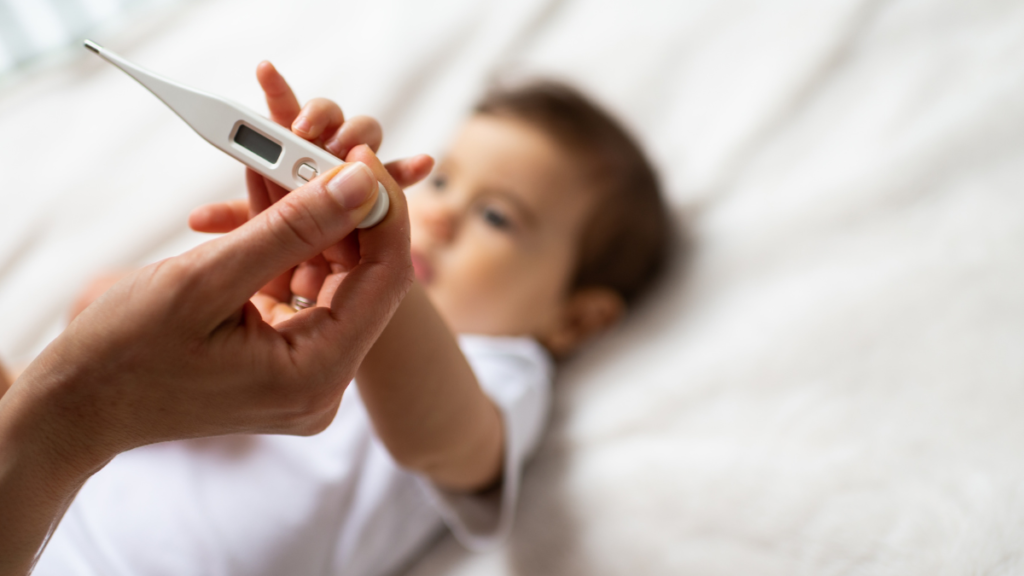
Everything is going great, you are blissfully in your regular exhausted state, finally ready to take a sip of that coffee from this morning that you found in the microwave and reheated for the second or third time…life is good. Then you notice your baby feels warm. She is a bit fussier today, her eyes look tired, she seems a bit off. You track down your thermometer after searching every drawer in the house. Finally, you find it located none other than, in your toddler’s dollhouse. You are able to confirm your suspicions- your baby has a fever. Ugh, poor little peanut. Does any of this sound familiar?!
So now what? What’s the protocol for handling a fever? Maybe this is your first baby and these are uncharted waters for you. Maybe you’ve managed this before, but never feel sure as to what to do. These are totally normal, valid, and real feelings. Fevers can be scary and can happen for varying reasons- viral infections, bacterial infections, post-immunization, among other conditions. In the end, your baby needs you, and you are going to need that cup of coffee- warm or cold!
How old is your baby? If she is 0-6 months old, you need to have her checked out by your healthcare provider. Your doctor will assess the baby and give you medical guidance. If your baby is older than 6 months, and otherwise appears well you can attempt to manage this fever at home. After a chat with your doctor, you still need to manage this fever at home (unless otherwise directed). So how can you help your little one feel better?
It is important that you check your baby’s temperature and monitor when it goes up, and when it comes down. You will most likely be directed by your doctor to give medication based on the baby’s temp. There are several different ways to check the temperature. Rectal temperatures are the most accurate in baby’s, however, if you don’t have a rectal thermometer, the axilla (underarm) is also accurate on babies.
If your baby is under the age of 6 months, follow your doctor’s recommendation for medication. Most likely they will recommend giving acetaminophen &/or ibuprofen. It is important that your baby is feeding well if taking ibuprofen. When giving these medications follow the instructions for dosing on the bottle, and ensure you don’t exceed the recommended dose in 24 hours. Write down what time you have given the medication and what the dose was. Ensure that all members of the family that are caring for your little one are aware of what mediation has been given. Writing it down helps remind you when the last dose was given, as this can be hard to keep track of after a couple of doses.
Offer your baby the breast or bottle often. For an infant, feeding can be a very soothing activity and is encouraged. Keeping her hydrated is very important. If your baby starts refusing to feed, this is a red flag that something more serious may be going on, and you need to speak with your doctor again. Watch for signs of dehydration such as decreased urination (fewer than 4 wet diapers in 24 hours in infants), increased thirst, absence of tears, dry skin, mouth and tongue, sunken soft spot (fontanelle) on your baby’s head.
When your baby is fevered, it is a good idea to limit the amount of clothing and blankets or swaddles that you are using. We want to help cool the baby down, but don’t want her to start to shiver. Shivering will help to increase body temperature, which is exactly what we don’t want right now.
A warm bath can be soothing to a baby, but it is encouraged to use caution with this. We do not want the baby to start shivering. If your baby settles well in the bath, and you feel this would be beneficial, then for sure, give it a try, just make sure that the water isn’t too cool, and limit the amount of time spent in the bath. As always, direct & hands-on attention at all times is essential in the water.
Keeping a close eye on your baby both day and night is important. If your baby sleeps in a different room some parents will choose to “Camp out” in the baby’s room, so they can easily check on the baby. Extra attention and cuddles are essential until this passes. Keep in mind that if you are holding a baby, or providing skin-to-skin care, you will want fewer clothing layers on the baby.
Calming your baby when she has a fever has a lot to do with managing the fever itself and staying close to your baby. When our little ones are sick it can be stressful for everyone. Do what you need to in order to find some rest for both you and your baby, lots of cuddles and feeds, and close communication with your health care provider will be key. Watch for symptoms of infection beyond the fever itself: runny nose, pulling at ears, irritability, difficulty breathing, malaise, and if in doubt get checked out! Don’t hesitate to reach out for help if you are worried about your baby. Call your local health line for more support and information, they are great resources for us to utilize.
© 2023 All rights reserved Baby & Toddler - part of parent promotions